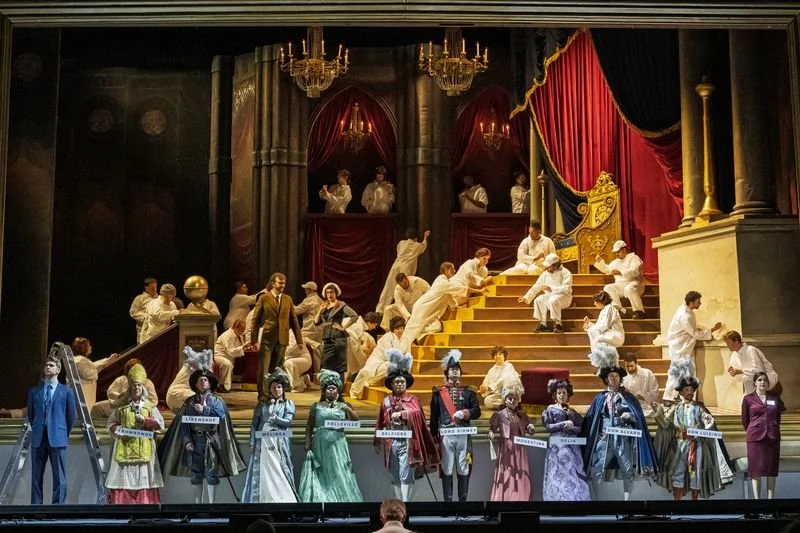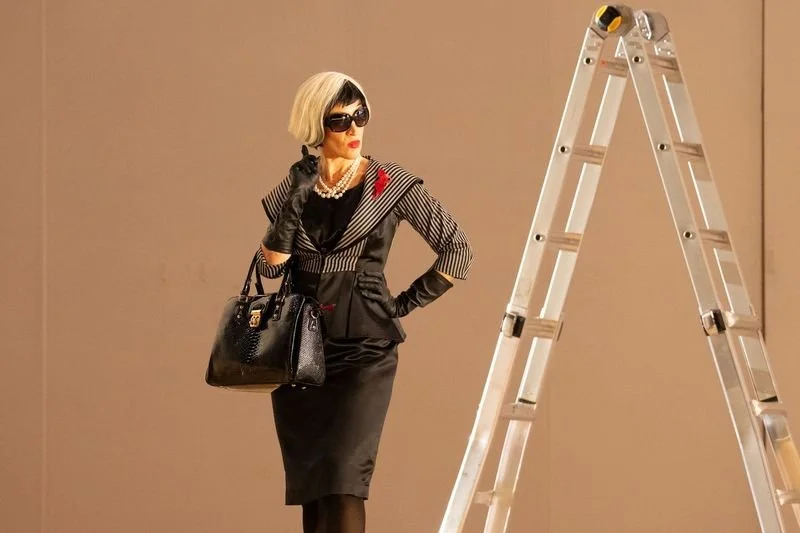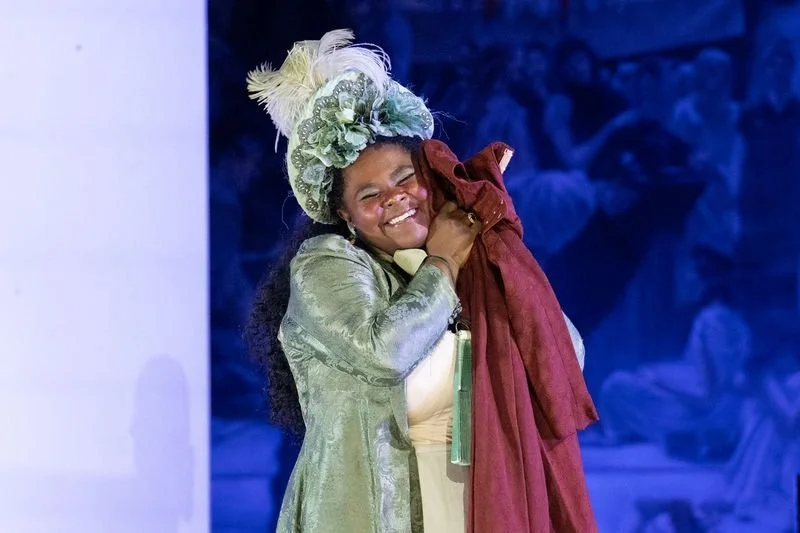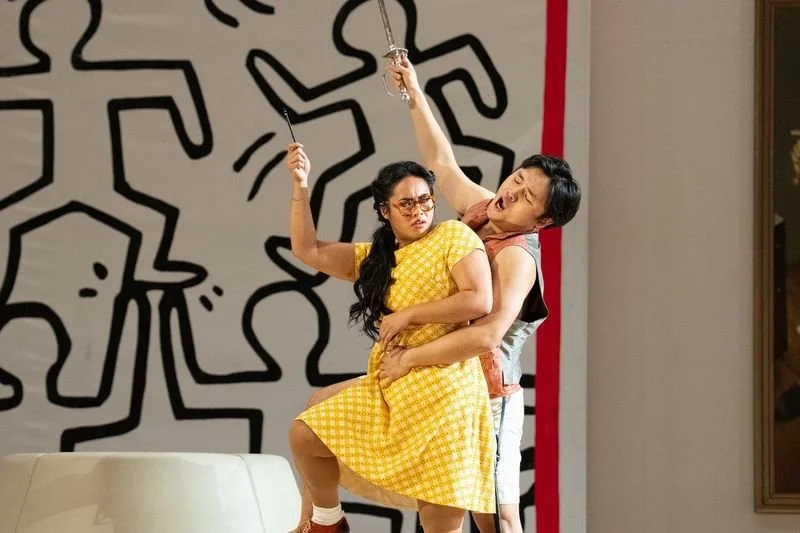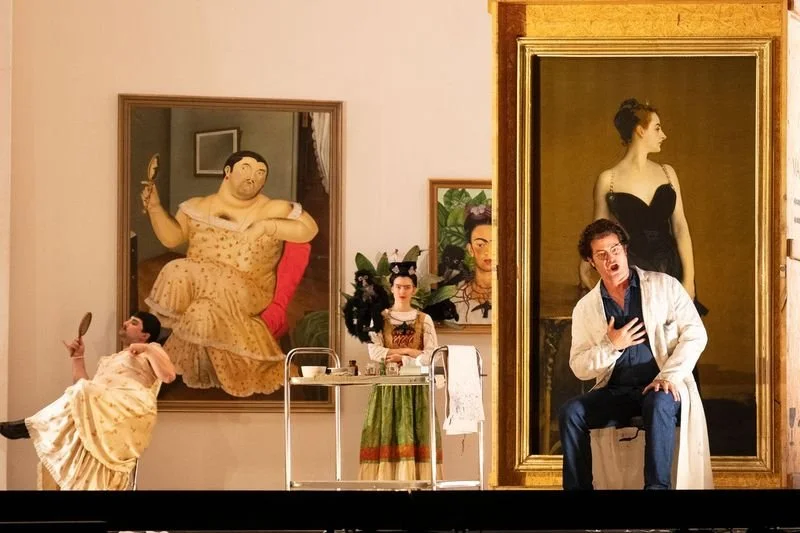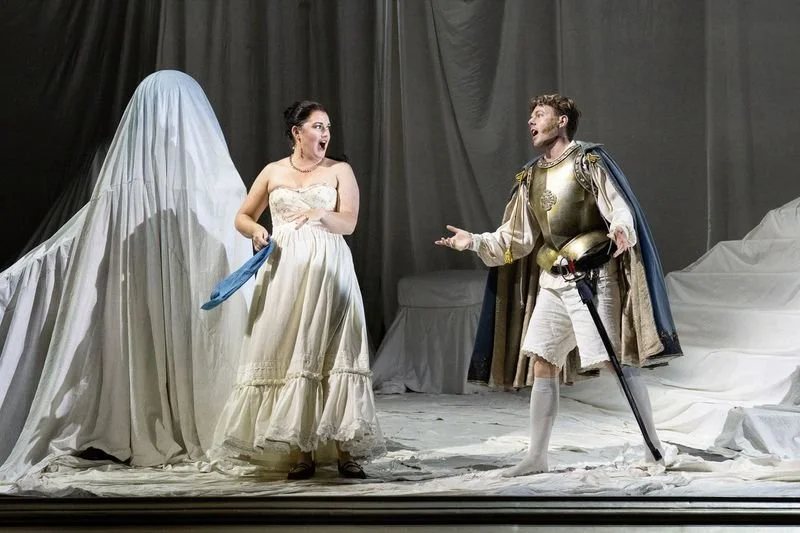General Director and President of Opera Philadelphia, and world-class countertenor, Anthony Ross Costanzo is now in his second year with OP and his first in full charge of the season’s program. In his first season, he took a big swing for the stressed opera company by instituting Pick Your Price seating, starting at $11 for any seat. OP played to packed houses last season and will again this season. How this all plays out for the success of the company is to be determined, but it has been enormously successful thus far, especially in attracting attendees new to opera (while many of the nation’s top companies struggle with declining attendance); OP also just held its most successful ever fund-raising gala. This season, President Costanzo takes another big swing with a new season he describes as “opera, but different”, a season which will include Costanzo singing a role himself (talk about pressure). Il viaggio a Reims (The Journey to Rheims, 1825), a classic opera by composer Giacchino Rossini and librettist Luigi Balocchi, opened Opera Philadelphia’s 50th anniversary season this year, but with a new storyline from the original. And this one appears to be the least “different” of this year’s offerings.
Cast photo of the developing final scene of Il viaggio a Reims directed by Damiano Michieletto. Photo by Steven Pisano; courtesy of Opera Philadelphia.
The title of my report is intended as a play on Pirandello’s famous Six Characters in Search of an Author, where six characters intrude on a rehearsal and demand that the director and actors tell their story. The “fourteen singers”, a large number for an opera, refers to a scene where there are fourteen singers on stage for a single ensemble number, an impressive feat for composer Rossini (take that Mozart!); the only plot is that the travelers, museum staff and paintings, with shared interest, are moving to a new location. Director Damaino Michieletto, in his first visit to America, presents his version of Il viaggio a Reims, keeping Rossini’s music and Balocchi’s libretto intact but substituting a story of his own, designed to make the opera more accessible to modern audiences, while keeping the more universal human flaws and interactions, lessening the themes of cultural differences and European unity. Though written as a comedy having a bit of fun with the characters, the opera’s original purpose was as an event to commemorate the 1825 coronation of Charles X of France. In the original, a diverse group of European aristocrats are headed to Reims for the coronation but due to a lack of horses, get stuck in a hotel on the way. Director Michieletto’s version, first produced by Dutch National Opera in 2015, changes the focus to the relationship between art and people and the premise to a diverse group of characters in an art gallery of today getting stuck because there were no hotel rooms in the new location for the gallery, I think. Admittedly, I was confused as to what exactly was going on in the first act; think of the Marx Brothers’ “A Night at the Opera” staged in an art gallery where the figures in the paintings come to life, not all completely clothed.
left: Brenda Rae as Madama Cortese. right: Lindsey Reynolds as La Contessa di Folliville. Photo by Steven Pisano; courtesy of Opera Philadelphia.
Composing a “commemorative opera” for the king’s coronation was a smart move by Rossini. He managed to wrangle a sizable pension from the king just four years later, after writing what would be his final opera, Guillaume Tell; he was only 37 years old and had been living in France since 1824. After surviving a scuffle with a new administration, he enjoyed 39 years of that pension before his death in 1876. The original version had a theme of European unity but worked in humorous social and political satire. The opera is occasionally performed today, after being lost and then resurrected in 1984, performed at “Rossini Opera Festival” in Rossini’s hometown of Pesaro, Italy; since 2001, the opera has been performed each year at the festival by young and upcoming singers. Many different, creative versions of the opera have been produced. Director Michieletto’s version is more focused on visual humor and human foibles but does end in a brilliantly constructed scene about the coronation of Charles X, via a painting by François Gérard. Humorous scenes in Act I include a duel between two men over a woman, all characters from a painting, and a scene where characters in modern paintings roam the stage. The second act seems at least more coherent as the nature of each character has become more familiar. Therein is an emotionally touching scene as two characters from a painting, experiencing a heated lover’s dispute, wind up advisers to a real-life couple having a similar fight in front of them, evidencing the bond between art and people, a major theme of General Director Costanzo’s.
Emilie Kealani as Corinna being pursued by Minghao Liu as Il Cavaliere Belfiore. Photo by Steven Pisano; courtesy of Opera Philadelphia.
Rossini wrote a vocally demanding opera that featured Europe’s best singers in honor of the new king. Opera Philadelphia included one opera superstar, soprano Brenda Rae but also featured a large, highly talented and accomplished group of singers who handled Rossini’s bel canto roles impressively. Ms. Rae sang with professionalism portraying the amusing uptight, stressed-out museum owner, Madama Cortese. I will single out a few other members of a huge cast. The most impressive vocal fireworks came in the scene featuring soprano Lindsey Reynolds as la Contessa di Folleville who was distraught over having nothing appropriate to wear to the new opening. Ms. Reynolds sang with the power and virtuosity that commanded my attention and delight, and to my ears garnered the loudest applause. Scott Conner had some fine moments as Lord Syndey restoring a painting (Sargent’s Madame X) while he falls in love with its subject (she responds), and bass-baritone Ben Brady was quite amusing as Don Profundo auctioning off museum pieces with a rapid-fire patter aria, fitting for an auctioneer. The love triangle of tenor Alistair Kent as Count Livenscof, baritone Alex DeSocio as Don Alvaro, and mezzo-soprano Katherine Beck as La Marchesa Melibea was a treasure. Australian Kent has performed in the major opera houses of Europe; he is an impressive young bel canto tenor whose singing most clearly represented bel canto. Alex DeSocio is a highly promising young baritone with a powerful and pleasing baritone voice; take note of Mr. DeSocio. Ms. Beck was pleasing in her singing and especially endearing in the scene comforting the female member of the feuding lovers. Finally, I will mention one more stand out performer, Filipino soprano Emilie Kealani singing the role of art student Corinna being pursued by Il Cavaliere Belfiore played amusingly by Minghao Liu . She sang beautifully in several highlight moments, the aria “Arpa gentil” for which she sang offstage accompanied by a harp and as the singer of the group-chosen aria finale, “All’ombra amena” which celebrates the coronation of Charles X. All the singers and chorus were pleasures and added significantly to the performance.
Scott Connor as Lord Sydney who has fallen in love with Madame X. Photo by Steven Pisano; courtesy of Opera Philadelphia.
If you like Rossini, this opera has terrific Rossini music played with passion and verve and romantic touches by the Opera Philadelphia Orchestra under the baton of Maestro Corrado Rovaris. The performance included a sneaky beginning that turned into a rousing overture and several musical interludes, almost breathtaking, with beautiful harp accompaniment for a couple of the arias. Yes, there were typical Rossini crescendos. This was an opera where I was tempted to close my eyes and just listen, but so much was happening on stage, I’d never catch up with the action. As is typical, the Opera Philadelphia Chorus Master’s work was excellent, kudos to Elizabeth Braden.
Katherine Beck as La Marchesa Melibea and Alisdair Kent as Il Barone di Libenskof having a lovers’ quarrel. Photo by Steven Pisano; courtesy of Opera Philadelphia.
Did the modernized staging work to make the work more accessible to today’s audiences? Not having seen a live performance with the original staging, I can only say that at least to some degree it succeeded, but the history lesson might have also been interesting, especially if it also included more luminaries like, for instance, OP veterans Lawrence Brownlee and Lisette Oropesa that would add to the fun. This version was well staged, with visually engaging sets and costumes, fast-paced scenes filled with humor, and some standout special effects, even involving us more emotionally near the end. The final scene was perfectly balanced for the Academy of Music stage. Kudos to the entire creative team: Director Damiano Michieleggo, Set Designer Paulo Fantin, Lighting designer Alessandro Carletti, Costume designer Carla Teti, and Hair and Makeup Designer Amanda Clark.
Opera Philadelphia’s production of Il viaggio a Reims is a fitting kickoff for its 50th anniversary season with new leadership on board. To everyone’s credit, the first act was effective as lighthearted if bewildering comedy; both acts excelled with the gorgeous music and arias of Rossini; and the last act is a must see for its brilliant staging, at least once. So, go for the music, the bel canto singing and its high entertainment value, but consider orienting yourself by reading the synopsis in the opera program before viewing; keep in mind that in this version, characters will be stepping in and out of paintings. Il viaggio a Reims certainly fits with the theme of “opera, but different”, and in a sense it could be viewed as President Costanzo’s coronation, whose tenure is playing like an opera itself; he deserves support as he attempts to stick the landing in the years to come.
The Fan Experience: Performances of Il viaggio a Reims were scheduled for September 19, 21, 26, and 28 in the Academy of Music. The opera was sung in Italian with English superscripts shown above the stage. The performance Friday night lasted a little over three hours with a 25 minute intermission splitting the three-act opera into two. The Pick Your Price format extends for the remainder of this opera season; very limited seats were available for remaining performances at the time of this report; it might be best to call Guest Services at 215-732-8400. Next up for OP is The Seasons which will feature countertenor Anthony Roth Costanzo, but alas, all three performances (December 19, 20, and 21) are sold out.
An informative and helpful pre-opera talk is given by OP scholar-in-residence Lily Kass one hour prior to performance. To paraphrase General Director and President Constanzo from his opening remarks, opera thy name is emergency. Forthwith, singer Anthony Reed who was to have played the role of Don Prudenzio was ill; this role was sung by bass-baritone Zachary Altman from the house left box and walked onstage by Assistant Director Anderson Nunnelley.

